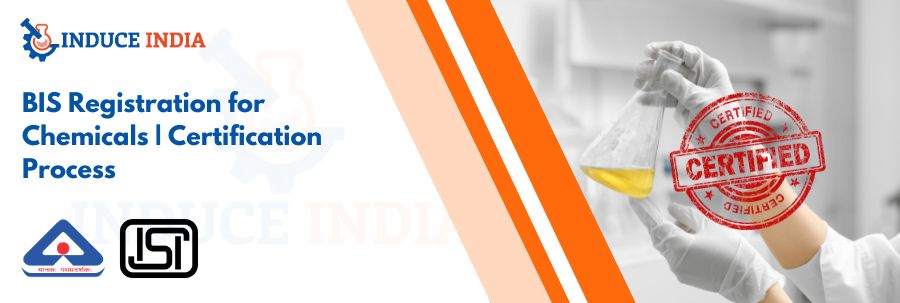The chemical industry of India is at the forefront of the country’s economic growth, supplying many industries such as agriculture, pharmaceuticals, textiles, and infrastructure. Keeping up with the growth of the industry, so the safety of its products, along with quality and regulatory compliance, ought to be the prime considerations. Here comes interference by BIS. BIS registration of chemicals is not merely a regulatory compliance; it is an instrument that generates trust, sets standards, and thus protects the environment and consumer interest.
In this blog, we delve deeper into the importance of BIS registration for chemicals, the process of certification, the benefits thereof, and the way businesses can procure smoother compliance with the correct implementation and support.
What is meant by BIS certification?
BIS is a national body for standardization functioning in the Department of Consumer Affairs, Ministry of Consumer Affairs, Food & Public Distribution. To get any product BIS certified means, in a way, to assure a consumer that the qualities, safety, and reliability of the product meet all standards set in India.
In many product categories, BIS certification is not mandatory, whereas certain chemicals have been made compulsory under government notifications issued by way of Quality Control Orders (QCOs). These are intended to protect against the import and sale of substandard goods that may become a hazard to public health or the environment.
Why is the registration of chemicals with BIS important?
The chemical industry, by its nature, deals with substances that may be hazardous when improperly handled-any such substances may be flammable, toxic, or hazardous to the environment. Thus, strict quality control standards must be maintained. BIS registration serves crucial purposes in:
- Ensuring Product Safety: To protect users and the environment from adverse effects.
- Export and Import Facilitation: To enable Indian manufacturers and foreign exporters to fulfill the requirements of the Indian market.
- Promoting Standardization: To ensure standard quality of chemicals and maintain uniformity in terms of brand names.
- Avoiding Legal Penalties: Heavy fines, product recall, and/or prosecution shall be awarded for not complying with mandatory BIS specifications.
BIS Certification Of Chemical Products
As per the recent notification issued by the DPIIT, it is now made clear that no chemical that falls under the QCO scheme is exempt from compulsory certification by BIS. Some chemicals that come under QCO schemes are hydrogen peroxide, sulphuric acid, acetic acid, aniline, methanol, phosphoric acid, nitric acid, toluene, xylene, chlorinated paraffin wax, and methylene chloride. The list keeps evolving, and therefore, a trader shall keep a keen eye on the latest additions and corresponding deadlines.
BIS Certification Schemes Applicable to Chemicals
BIS certification can be obtained under either of the two main schemes, depending on the nature of the product and its being processed either in India or imported into India:
The BIS grants certification under the ISI Mark Scheme for chemical manufacturers situated in India. The ISI mark on the product signifies conformity with the relevant Indian standards (IS codes).
Foreign chemical manufacturers exporting to India have to obtain certification under the FMCS scheme. Under this scheme, a non-Indian manufacturer can use the BIS standard mark on its products post evaluation and inspection by BIS officials.
BIS Certification Process for Chemicals
The following is the stepwise process for granting BIS certification:
Step 1: Identify Applicable Standard
Each chemical product has to comply with a particular Indian Standard (IS code). It is incumbent upon the business to ascertain what standard is applicable to the product.
Example: For Acetic Acid, the IS code applicable is IS 695:1973.
Step 2: Application Submission
Applicants shall submit their applications on the BIS portal along with the following documents:
- Company corporation certificate
- Manufacturing process details
- Product specification and composition
- Test reports (from BIS-recognised laboratories)
- Factory layout and details of quality control
Step 3: Testing & Sampling Testing of Samples:
Post the application verification, BIS officials carry out manufacturing site inspections. Samples are drawn and tested in BIS-approved laboratories to check for compliance with the relevant Indian standard.
Step 4: Grant of License
Licenses are granted if all tests are satisfactorily passed and the factory is in conformity with BIS specifications and regulations, which allow the grant of a Standard Mark use license to domestic manufacturers or a BIS certification number for FMCS applicants.
Step 5: Surveillance & Renewal
Periodic surveillance inspections are conducted by BIS to ensure continuous compliance. The certification is generally valid for two years, and the manufacturers have to apply for its renewal before expiry.
Challenges in BIS Certification for Chemicals
Documentation complexity: Numerous technical and legal documents are needed.
- Laboratory availability: Limited BIS-recognised labs can cause delays.
- Cost: Certification costs, especially under FMCS, can be high for small manufacturers.
- Technical compliance: Understanding and implementing Indian Standards may require expert guidance.
How Induce India Can Assist
At Induce India, our conscience tells us that BIS certification is a difficult domain to navigate, especially for SMEs and first-time exporters. Our end-to-end certification support services include:
- Identifying relevant IS Codes for your chemical products
- Documentation and technical file preparation
- Liaise with BIS officials
- Coordination of lab testing and factory audits
- Renewals and compliance updates on time
With experienced consultants and a client-first approach, we help you avoid delays, minimize costs, and speed market entry.
Key Advantages of the BIS Certification for Businesses
- Legal Compliance: An Indian government mandate.
- Market Access: Easiest route into the regulated markets.
- Brand Reputation: Elevate trust from the customer and visibly lead quality assurance.
- Competitive Edge: Demand that certified products be required for tenders and bids, be it at the domestic or international level.
- Sustainability & Safety Standards: Comply with global safety and environmental standards.
Final Words
With the Government of India underway to restrict quality norms, therefore, our chemical sector is being converted into a much more responsible and competitive industry. BIS registration is not a mere regulatory hurdle; it is the hallmark of quality that would lend to building lasting credibility. For chemical manufacturers and importers, understanding and obeying BIS certification would open the gates for support and prevent any disruptions in business operations.
For you, Induce India serves as a trusted partner on this journey. Be it a domestic manufacturer or a global exporter, we simplify BIS registration for chemicals from your end so that you may concentrate on what you do well: supplying good-quality products to the market.



